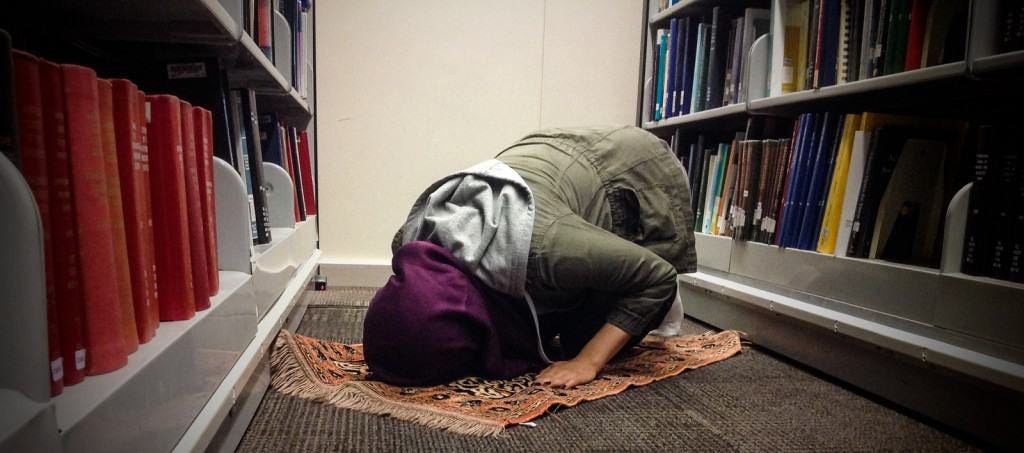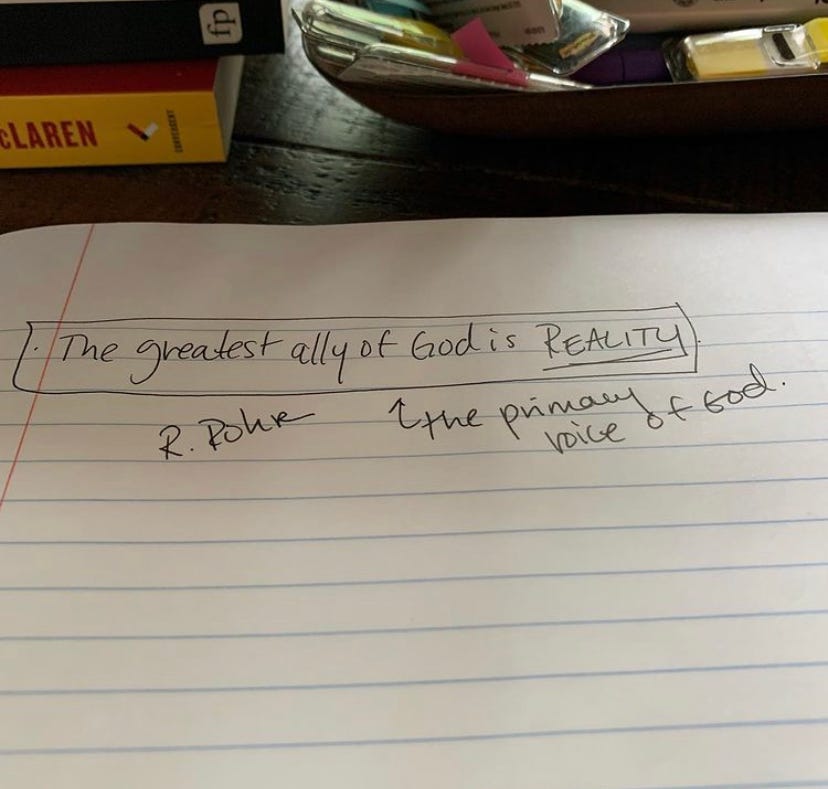The Spiritual Practice of Truth Telling
Boundaries, Reality as the Primary Voice of God, Discernment, & Speaking Truth to Power
“There was truth and there was untruth, and if you clung to the truth even against the whole world, you were not mad.” - 1984, George Orwell
When my mother sent me the first chain email claiming that Donald Trump was chosen by God I responded by asking her to please stop sending me what I considered “toxic rhetoric.” I told her the area of politics was not something that we had the capacity to discuss civilly as a family. I sent her back an Op-Ed written by John Kasich, who was the person my parents had voted for in the 2016 Republican primary. My mother responded by saying, “You have a very narrow vision of God’s power or who He can use to accomplish His plans. I won’t ‘engage’ you in any more political thoughts that you can’t handle. As Kasich said, ‘I’ll just be nice.’”
After this interchange I blocked my parents for about a month.
When my mother sent me the second chain email claiming that Donald Trump had been chosen by God to lead us into a new glorious age (literally the same one as the first) I deleted it, texted my like-minded brother and vented for 20 minutes. When my father sent me and my children a conspiracy theory video with the heading, “please watch – this is important” I watched it. I did not, however, respond. I sat silent on text streams as my family debated the merits of taking down confederate monuments or Black Lives Matter protests. There was nothing I could say that would make any difference. Over the years my voice had been met with contempt. I tried to have small civil conversations individually. But finally, as the Capitol was under siege and our family group chat started sharing articles and theories that the mob was led by Antifa rather than rabid Trump supporters, white supremacists, and actual domestic terrorists, I was out.
I’ll stop here to say that I’m not proud of my silence, and I understand my privilege affords me this option. Maybe you feel the same way. When I went through my divorce I read an article written by a couples counselor that said the only thing that couples can’t come back from is contempt. At that point, the therapist said, he knows it’s over. So how, when faced with contempt and perhaps when feeling it ourselves, do we use our voices in ways that make a difference?
In 2019 I read one of Brene Brown’s many books and one of her many truth-sayings struck me like a ton of bricks. “The most compassionate people are the most boundaried.” Her reasoning is that you can’t be compassionate AND feel like you are being taken advantage of at the same time. It’s not possible. Resentment is inevitable. So in order to stay in relationship that is centered on love and compassion, you need to do the work of boundary setting.
“The most compassionate people are the most boundaried.” - Brene Brown
I had mentioned this learning to my sister (an enneagram 5) who said, “I don’t buy it. I’m the most boundaried person around and I am not compassionate.” She wasn’t wrong. That got me to thinking, it’s not quite as cut and dry as Brene says it is. Like most things, it’s more nuanced.
People pleasing and co-dependency or a no-boundary relationship sets us up for resentment and a loss of compassion. And yet, building up Fort Knox and blocking everyone who disagrees with you is the Jungian equivalent of “what you resist, not only persists but grows in size.” They’re sides of the same coin and both too easy.
The difficulty lies in what Brene doesn’t mention, that setting boundaries is a fluid and ongoing process that is painful and deliberate. Some days (or months) you may have to set up Fort Knox in your heart to survive the turbulence. Other days, you need your mom and dad.
Post-truth is pre-fascism, and Trump has been our post-truth president. When we give up on truth, we concede power to those with the wealth and charisma to create spectacle in its place. Without agreement about some basic facts, citizens cannot form the civil society that would allow them to defend themselves. If we lose the institutions that produce facts that are pertinent to us, then we tend to wallow in attractive abstractions and fictions. Truth defends itself particularly poorly when there is not very much of it around, and the era of Trump — like the era of Vladimir Putin in Russia — is one of the decline of local news. Social media is no substitute: It supercharges the mental habits by which we seek emotional stimulation and comfort, which means losing the distinction between what feels true and what actually is true. - from the essay “The American Abyss” by Timothy Snyder
What are the spiritual implications of living in a “Post-Truth” world?
What do spiritual teachings offer us in these turbulent times?
What can be our practice?
These have been the questions on my heart in these last weeks, and so here’s my attempt at what a practice of Truth Telling may look like.
Prayer and Meditation: Grounding in Truth
We have examples of the boundaries of prayer/meditation in all faith traditions. In all traditions, prayer does not take us away from reality but right into the heart of what is real. In neuroscience terms, spending time in silent meditation allows us to step back and be curious about what’s in our brain. It is the first step towards discernment and right thinking.
Observant Muslims pray five times a day. “Such is the importance of prayer in Islam that when the call of prayer is made, Muslims are duty bound to leave their work and pray. This is to bring a person back to his or her reality. No matter how busy and engrossed one may be in this worldly life, one is reminded of the existence of a Higher Being and the accountability to the Maker in faith and deeds.” (The Power of Prayer in Islam)
Siddhartha, the Buddha, meditated for 6 years until finding enlightenment under a sacred fig tree. “Buddhists don’t meditate to ‘commemorate’ the Buddha’s realization of the truth, but to realize it for themselves, firsthand… As the Buddha once said, ‘He who is mentally concentrated, sees things according to reality.’” (SN XXII. 5) (Why Do Buddhists Meditate?)
In the Judeo Christian tradition, “Prayer is a practice, a spiritual practice. The objective of prayer practice is to increase one’s awareness of God, to use traditional language. The medieval teacher Rambam (Maimonides) explained that in prayer, we pour out our hearts like water before the Holy One of Blessing. Not only when we are in pain or in need. He recommends that we pour out our hearts every day, even when there is nothing bothering us.” (How to Pray) Jesus was always going off to pray in the desert. He needed to leave the noise and move out into solitude, not to be nearer to God, but to be more aware of God’s presence.
But as for you, when you pray, go into your inner room, close your door, and pray to your Father who is in secret; and your Father who sees what is done in secret will reward you. - Matthew 6:6, NASB
The greatest ally of God, the primary voice of God is REALITY. - Richard Rohr
Discernment: Check Your Sources, Limit Your Consumption, Focus Your Attention
I remember the day I realized how dangerous Fox News was. I was visiting my parents where the television was perpetually on. Though I wasn’t listening to what Glenn Beck was saying, I noticed that my nervous system was on fire. I was on vacation but completely stressed out. I wasn’t even listening to the rhetoric, but somehow just the tone of the speech was enough to send oodles of cortisol throughout my body. Then I’d borrow the car to get away for a bit and as I turned the key, immediately the angry yelling of conservative talk radio hosts blared. It was like something out of The Manchurian Candidate.
How is anyone’s sense of reality supposed to survive the echo chamber of fear mongering. And its not just on the right.. since all this started I can feel CNN doing the same thing to my brain. I can feel myself jonesing for Jake Tapper and getting a burst of serotonin when I hear Anderson Cooper’s voice. So wherever you stand - it’s always going to be more dangerous to listen than it is to read. Limit your consumption of digital media.
Even reading the newspaper has its limits. We are not created as humans to know everything ALL the time on a global scale. Neither the feelings of overwhelming anxiety nor numbing detachment seem like healthy responses to the REALITY and the truth of what is going on. So, how might we be able to feel differently about an onslaught of terrible world news about which we have so little control?
One simple way to start is to focus your information-gathering efforts on things that literally are closer to home – grass roots, local news from your area where you can actually make a difference. And with that…
Use Your Voice: Speaking Truth to Power
I sit and write this on Martin Luther King Jr. Day. The juxtaposed imagery of the “I Have a Dream” speech in front of the Lincoln Memorial almost 60 years ago against the Capitol Insurgence a few weeks ago has been reeling in my head all day. Some might say that both are examples of constitutional free speech. That may be, but I’d argue that they couldn’t be more different. One is based on Truth and one on Lies. (Not to mention one of those gatherings were a people who were victims of violence and one was a gathering of violent perpetrators.)
But that being said, in these last months, I’ve also been lifted by stories of individual people using their spheres of influence to speak truth to power. I was moved by athletes across the country who protested the death of George Floyd by walking out of their games. I was inspired by the work of mayors, activists, and historians across the country to address the issue of Confederate statues built, not within the historical framework of the Civil War, but in the shadow of Jim Crow. The Hoop Bus , BLM protests and my own community of students, parents and teachers taking part in standing up for Black Lives have and continue to inspire me.
I stand in awe of Black women, including Stacey Abrams, Elizabeth Williams and all the women of the Atlanta Dream who literally have changed the course of American politics.
And while Abrams warned us against making Georgia’s Secretary of State Brad Raffensperger into a hero as he has been guilty of voter suppression tactics in the past, I can’t help but be inspired by his brave stance against the lies, pressure and threats of the President of the United States. And even as Trump has whined about the dangers of “Big Tech” censoring free speech, the true narrative is that the employees of Twitter lobbied their boss, CEO Jack Dorsey, to ban Trump because of the violent rhetoric that is against the user agreement policy, not against free speech.
And finally, I’ve been inspired by the work of individuals in my own community. My friends Lydia, Deb and Kelly at Bridge of Hope Ministries that work tirelessly for the unhoused; my friends Jonathan, Sarah and Carroll who are bringing truth-telling and Equity Education to teachers and young people; and my friend Erin, who advises our school newspaper that “is designed, written and maintained by students and all content decisions are made by students.” Very rare in secondary education. And I’m inspired by her writers, particularly Ivy Reed who as a freshman won 2nd place in the nation for Sports Story of the Year on her covering Missouri legislation for Transgender athletes and was a finalist for National Writer of the Year.
Look around you. Who is inspiring you with their voice?
So pray in order to see the Truth more clearly. Guard your heart and mind from not only disinformation but too much and overwhelming information. And, in places where your voice is met with contempt, do not be silenced. However, remember that no one is ever entitled to your voice either. Instead find your sphere of influence and make a difference.
But the fruit of the practice of Truth Telling is that all Truth is in fact God’s Truth and when people like Dr. King or even you bring truth out into the light, you may very well be met with anger, but you will also add to the stream of healing and justice and freedom.










Thank you for this - much needed.